 This list is not meant to assess the thousands of Christian books published each year, let alone every interesting book published in 2015. I read a lot of books, but there are plenty of worthy titles that I never touch (and never hear of). This is simply a list of the books (Christian and non-Christian, but all non-fiction) that I thought were the best in the past year (including the last few months of the previous year).
This list is not meant to assess the thousands of Christian books published each year, let alone every interesting book published in 2015. I read a lot of books, but there are plenty of worthy titles that I never touch (and never hear of). This is simply a list of the books (Christian and non-Christian, but all non-fiction) that I thought were the best in the past year (including the last few months of the previous year).
When I say “best” I have several questions in mind:
• Was this book well written and enjoyable to read?
• Did I find it personally challenging, illuminating, edifying, or entertaining?
• Is it a book I am likely to reread or consult often?
• Do I see myself frequently recommending this book to others?
Undoubtedly, the “best” books reflect my interests and inklings. This doesn’t mean I agree with every point in all these books, but it does mean I found them helpful and insightful. There is nothing scientific about my list, but here goes:
Honorable Mentions (Scotland edition!)
- Ronald Lyndsay Crawford, The Lost World of John Witherspoon: Unravelling the Snodgrass Affair, 1762 to 1776 (Aberdeen University Press)
- Jane Dawson, John Knox (Yale University Press)
- John Macleod, Scottish Theology in Relation to Church History (Banner of Truth, reprinted)
Top Ten
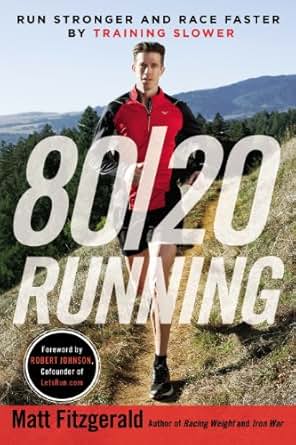 10. Matt Fitzgerald, 80/20 Running: Run Stronger and Race Faster by Training Slower (New American Library). Little known fact: although I don’t usually mention them on my blog, I read a bunch of running/swimming/biking books. I go through them like Skittles. This book in particular got me thinking about a new way of training. Who wouldn’t want to run faster by running slower! The basic gist: make 80% of your running easy and 20% hard. When you get into the details of the concept, you see it’s not quite that simple, but as a general rule of thumb it makes a lot of sense. At the very least, this book described my running perfectly–never too easy, never extremely hard, almost always moderately difficult. I’m eager to try a different approach.
10. Matt Fitzgerald, 80/20 Running: Run Stronger and Race Faster by Training Slower (New American Library). Little known fact: although I don’t usually mention them on my blog, I read a bunch of running/swimming/biking books. I go through them like Skittles. This book in particular got me thinking about a new way of training. Who wouldn’t want to run faster by running slower! The basic gist: make 80% of your running easy and 20% hard. When you get into the details of the concept, you see it’s not quite that simple, but as a general rule of thumb it makes a lot of sense. At the very least, this book described my running perfectly–never too easy, never extremely hard, almost always moderately difficult. I’m eager to try a different approach.
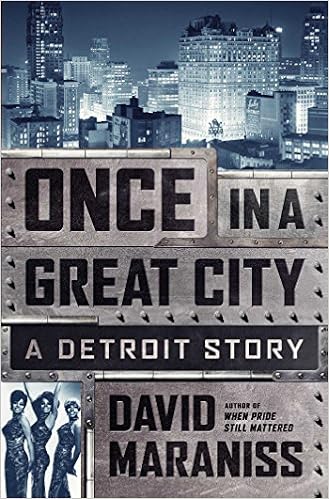 9. David Maraniss, Once in a Great City: A Detroit Story (Simon and Schuster). Born in Detroit, Maraniss is a Pulitzer Prize-winning journalist and associate editor at the Washington Post. In this extremely readable account of Detroit circa 1962-64, one sees a picture of a vibrant city with the hustle and bustle of a booming auto industry and the cultural cache of the Motown music scene. For people who only know what Detroit is (and there are good things happening even now), the story Maraniss tells can seem other worldly. Did you know Detroit was the U.S. choice for the 1968 summer Olympics? Did you know Martin Luther King Jr. first gave his “I have a dream” speech–at least many of the lines from the stirring conclusions–in Detroit in 1963, a few months before reworking the message for the Lincoln Memorial later that summer? Did you know the Ford Rotunda, which as destroyed in 1962, once boasted of being the fifth most popular tourist destination in the United States, receiving more visitors in the 1950s than the Statue of Liberty? More sobering, did you know that already in 1963s, researchers at Wayne State University were warning that Detroit–before the race riots and before the collapse of the automobile industry–was headed for major trouble and rapid depopulation? You don’t have to be a Michigander to find this a fascinating read.
9. David Maraniss, Once in a Great City: A Detroit Story (Simon and Schuster). Born in Detroit, Maraniss is a Pulitzer Prize-winning journalist and associate editor at the Washington Post. In this extremely readable account of Detroit circa 1962-64, one sees a picture of a vibrant city with the hustle and bustle of a booming auto industry and the cultural cache of the Motown music scene. For people who only know what Detroit is (and there are good things happening even now), the story Maraniss tells can seem other worldly. Did you know Detroit was the U.S. choice for the 1968 summer Olympics? Did you know Martin Luther King Jr. first gave his “I have a dream” speech–at least many of the lines from the stirring conclusions–in Detroit in 1963, a few months before reworking the message for the Lincoln Memorial later that summer? Did you know the Ford Rotunda, which as destroyed in 1962, once boasted of being the fifth most popular tourist destination in the United States, receiving more visitors in the 1950s than the Statue of Liberty? More sobering, did you know that already in 1963s, researchers at Wayne State University were warning that Detroit–before the race riots and before the collapse of the automobile industry–was headed for major trouble and rapid depopulation? You don’t have to be a Michigander to find this a fascinating read.
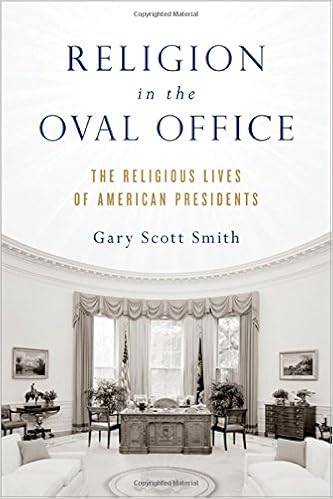 8. Gary Scott Smith, Religion in the Oval Office: The Religious Lives of American Presidents (Oxford University Press). I confess that I haven’t made my way through the whole book, but I’ve poked around a good chunk of it. The book is well researched, balanced, and relentlessly interesting. Smith covers 11 presidents (Adams, Madison, Adams, Jackson, McKinley, Hoover, Truman, Nixon, Bush 41, Clinton, Obama) and makes a compelling case that religion–though vastly different in many instances–was nevertheless genuinely important for each of these men.
8. Gary Scott Smith, Religion in the Oval Office: The Religious Lives of American Presidents (Oxford University Press). I confess that I haven’t made my way through the whole book, but I’ve poked around a good chunk of it. The book is well researched, balanced, and relentlessly interesting. Smith covers 11 presidents (Adams, Madison, Adams, Jackson, McKinley, Hoover, Truman, Nixon, Bush 41, Clinton, Obama) and makes a compelling case that religion–though vastly different in many instances–was nevertheless genuinely important for each of these men.
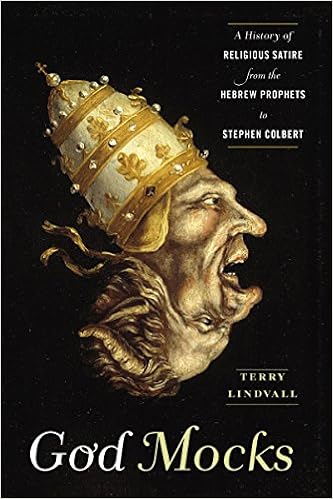 7. Terry Lindvall, God Mocks: A History of Religious Satire from the Hebrew Prophets to Stephen Colbert (New York University Press). Besides providing a number of examples that make you say, “Wow, I can’t believe they wrote that,” this academic work is especially helpful in simply making the case (rather obvious when you know what to look for) that Christianity has a long history of using satire to make a point. Many Christians instinctively recoil at the thought of religious satire, but Lindvall argues that being a Christian satirist is rooted in the nature of God: we worship a God who–like it or not–mocks (at least at times). Lindvall, the C.S. Lewis Chair of Communication and Christian Thought at Virginia Wesleyan College, plots his historical examples along an x-axis which moves left to right from ridicule to moral purpose and a y-axis which moves upward from rage to humor. He maintains that landing in the upper most quadrant (humor with a moral purpose) is where satire is most salutary.
7. Terry Lindvall, God Mocks: A History of Religious Satire from the Hebrew Prophets to Stephen Colbert (New York University Press). Besides providing a number of examples that make you say, “Wow, I can’t believe they wrote that,” this academic work is especially helpful in simply making the case (rather obvious when you know what to look for) that Christianity has a long history of using satire to make a point. Many Christians instinctively recoil at the thought of religious satire, but Lindvall argues that being a Christian satirist is rooted in the nature of God: we worship a God who–like it or not–mocks (at least at times). Lindvall, the C.S. Lewis Chair of Communication and Christian Thought at Virginia Wesleyan College, plots his historical examples along an x-axis which moves left to right from ridicule to moral purpose and a y-axis which moves upward from rage to humor. He maintains that landing in the upper most quadrant (humor with a moral purpose) is where satire is most salutary.
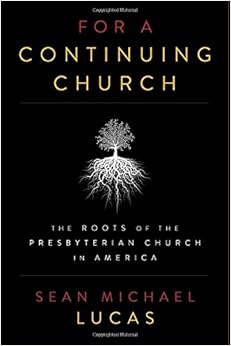 6. Sean Michael Lucas, For a Continuing Church: The Roots of the Presbyterian Church in America (P&R Publishing). With a few years of doctoral work under my belt, I have a much better eye for good history than I did before, and I can tell you that Sean Lucas is a very good historian. His prose is fair, readable, insightful, and steeped in primary sources. I loved reading this book because it explains the origins of my new denominational home. But it’s much more than a PCA book. It’s nothing less than a history of Southern Presbyterianism (and some Northern Presbyterianism) in the twentieth century. I’m excited to reread this book and keep learning.
6. Sean Michael Lucas, For a Continuing Church: The Roots of the Presbyterian Church in America (P&R Publishing). With a few years of doctoral work under my belt, I have a much better eye for good history than I did before, and I can tell you that Sean Lucas is a very good historian. His prose is fair, readable, insightful, and steeped in primary sources. I loved reading this book because it explains the origins of my new denominational home. But it’s much more than a PCA book. It’s nothing less than a history of Southern Presbyterianism (and some Northern Presbyterianism) in the twentieth century. I’m excited to reread this book and keep learning.
 5. Rosaria Butterfield, Openness Unhindered: Further Thoughts of an Unlikely Convert on Sexual Identity and Union with Christ (Crown & Covenant). What can you say about Rosaria? She is so honest, so unflinchingly truthful, so tender, so realistic, so hopeful, so wise, so down to earth, and so heavenly minded. As you try to sort through the wreckage of the sexual revolution–either in the culture or in your own life (or both)–make sure this is one of the books you read.
5. Rosaria Butterfield, Openness Unhindered: Further Thoughts of an Unlikely Convert on Sexual Identity and Union with Christ (Crown & Covenant). What can you say about Rosaria? She is so honest, so unflinchingly truthful, so tender, so realistic, so hopeful, so wise, so down to earth, and so heavenly minded. As you try to sort through the wreckage of the sexual revolution–either in the culture or in your own life (or both)–make sure this is one of the books you read.
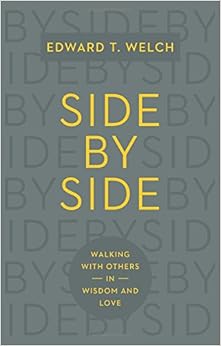 4. Edward T. Welch, Side by Side: Walking with Others in Wisdom and Love (Crossway). I love simple books that aren’t simplistic. This is a terrific book about loving one another, about helping hurting people, about getting help as hurting people, about being a good neighbor, and about being the body of Christ. Our whole staff is reading the book this semester. The insights aren’t new, but the reminders are extremely helpful and the points of application unusually practical and life giving.
4. Edward T. Welch, Side by Side: Walking with Others in Wisdom and Love (Crossway). I love simple books that aren’t simplistic. This is a terrific book about loving one another, about helping hurting people, about getting help as hurting people, about being a good neighbor, and about being the body of Christ. Our whole staff is reading the book this semester. The insights aren’t new, but the reminders are extremely helpful and the points of application unusually practical and life giving.
 3. Barton Swaim, The Speechwriter: A Brief Education in Politics (Simon and Schuster). I started and finished this in the same day. The book is hilarious and cringe-worthy and brutal and restrained and sad and optimistic all at the same time. Most of all, it’s well written, and every page is interesting.
3. Barton Swaim, The Speechwriter: A Brief Education in Politics (Simon and Schuster). I started and finished this in the same day. The book is hilarious and cringe-worthy and brutal and restrained and sad and optimistic all at the same time. Most of all, it’s well written, and every page is interesting.
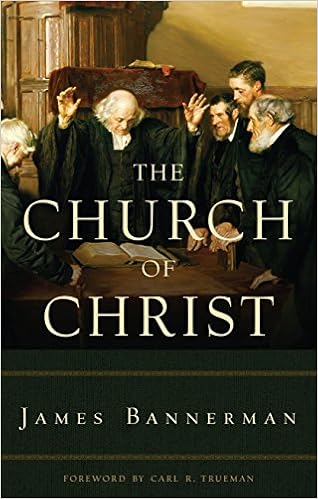 2. James Bannerman, The Church of Christ (Banner of Truth, reprinted). I read an earlier (much less attractive) printing of this book (by a different publisher) several years ago, and since then I’ve gone back to Bannerman time after time. There is simply no more thoughtful book on ecclesiology from a Presbyterian perspective. It’s so good that even Congregationalists will benefit from it. Reformed pastors need this book on their shelves.
2. James Bannerman, The Church of Christ (Banner of Truth, reprinted). I read an earlier (much less attractive) printing of this book (by a different publisher) several years ago, and since then I’ve gone back to Bannerman time after time. There is simply no more thoughtful book on ecclesiology from a Presbyterian perspective. It’s so good that even Congregationalists will benefit from it. Reformed pastors need this book on their shelves.
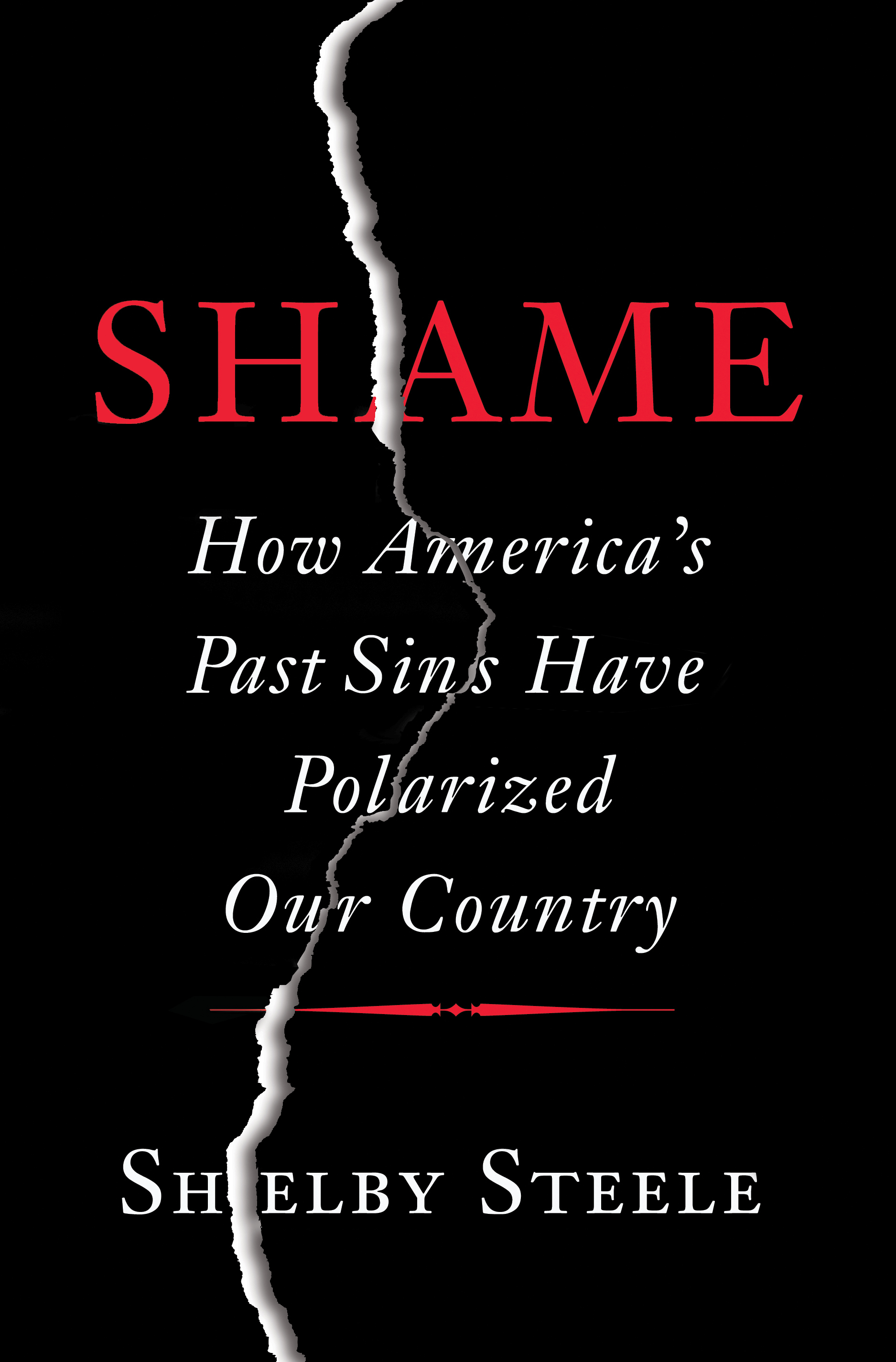 1. Shelby Steele, Shame: How America’s Past Sins Have Polarized Our Country (Basic Books). More than any other book I read this year, this is the one I wanted to read through again in a small group. I’d love to hear what my friend (or enemies) think about Steele’s poignant account of racism in his own experience (he’s African American) and his argument that today’s liberalism is not about helping people like him as much as it is about moving from relativism to dissociation to legitimacy to power. This is a book to be read slowly, discussed, digested, and–though I don’t know anything about Steele’s personal faith or lack thereof–dare I say, even prayed over.
1. Shelby Steele, Shame: How America’s Past Sins Have Polarized Our Country (Basic Books). More than any other book I read this year, this is the one I wanted to read through again in a small group. I’d love to hear what my friend (or enemies) think about Steele’s poignant account of racism in his own experience (he’s African American) and his argument that today’s liberalism is not about helping people like him as much as it is about moving from relativism to dissociation to legitimacy to power. This is a book to be read slowly, discussed, digested, and–though I don’t know anything about Steele’s personal faith or lack thereof–dare I say, even prayed over.


















